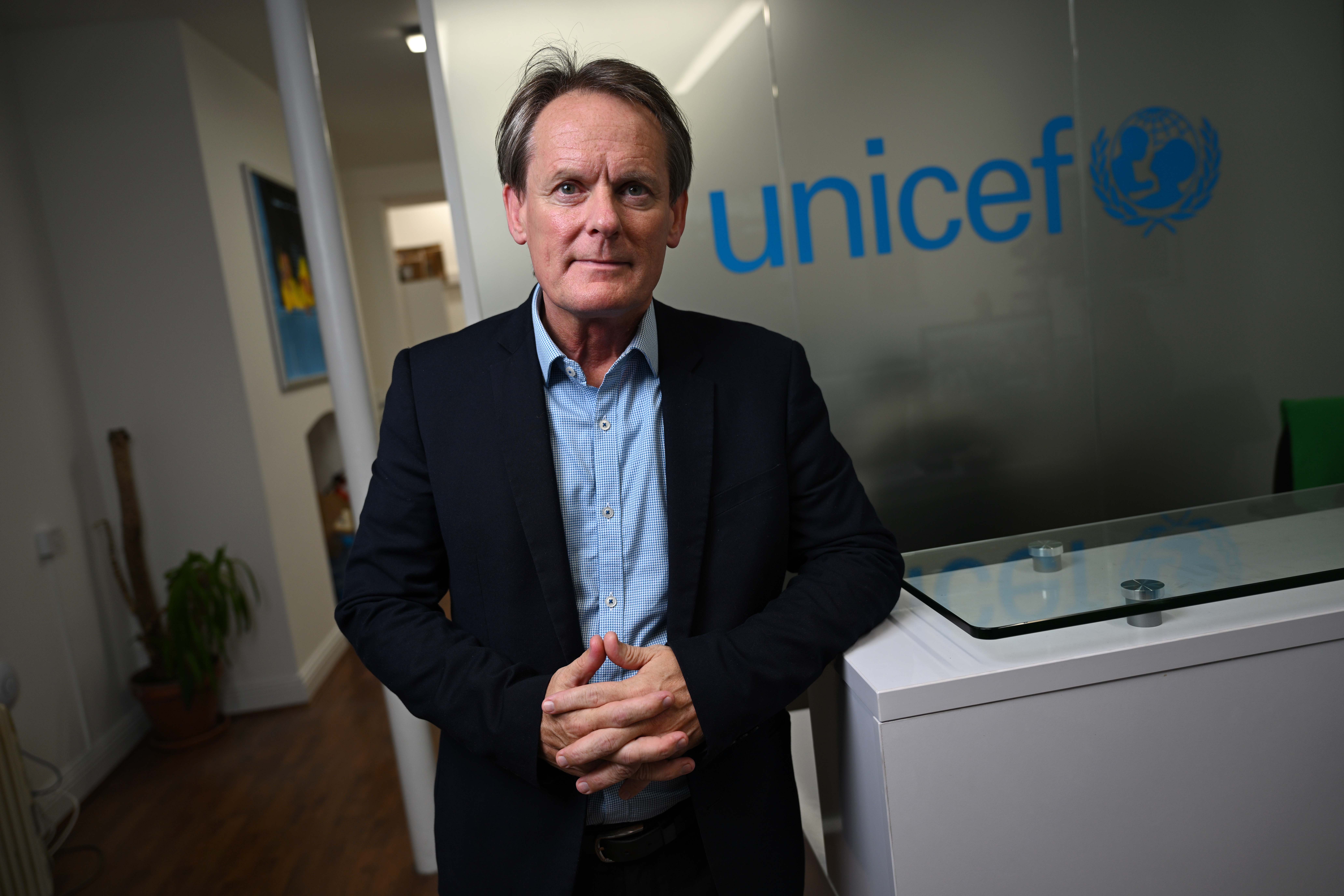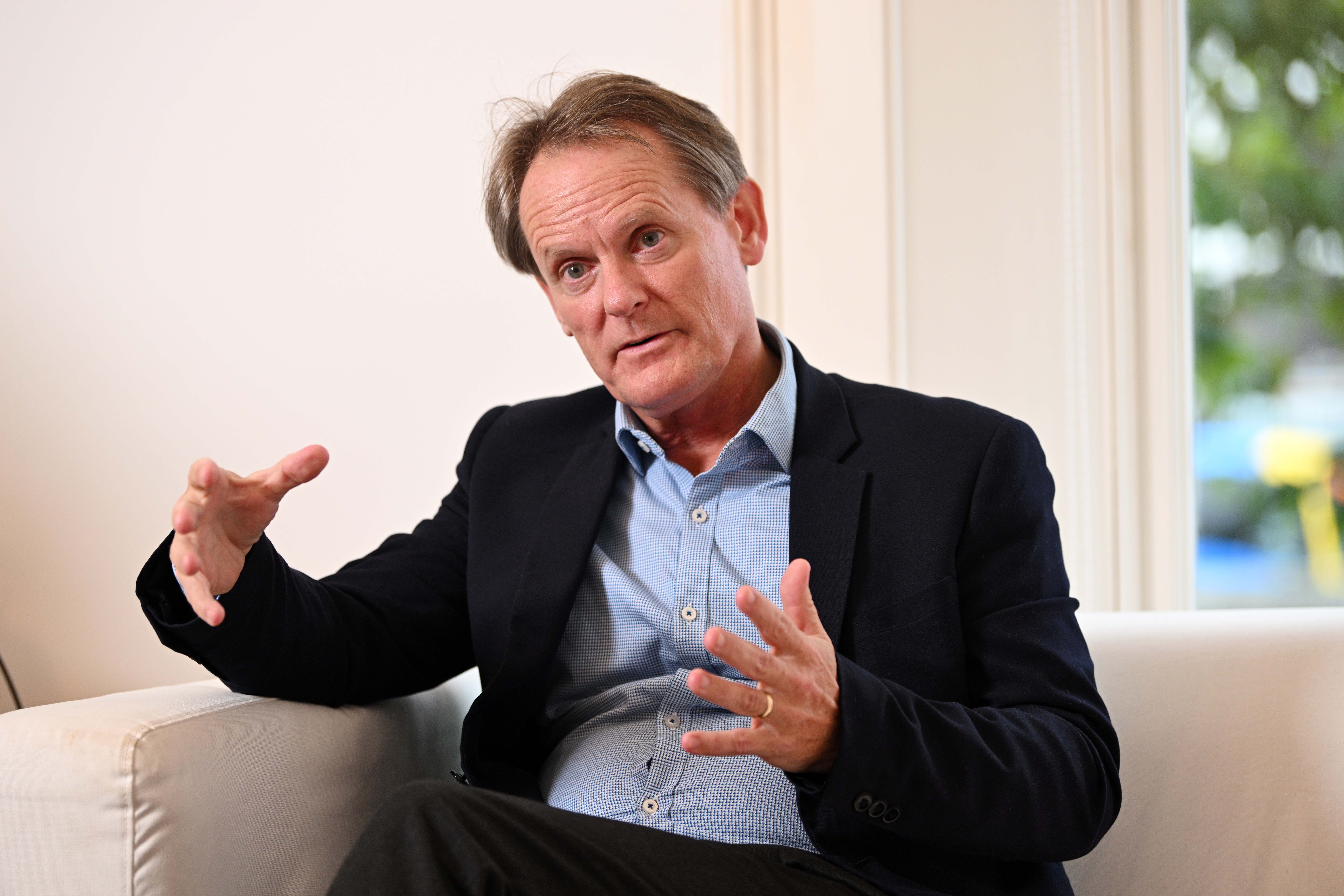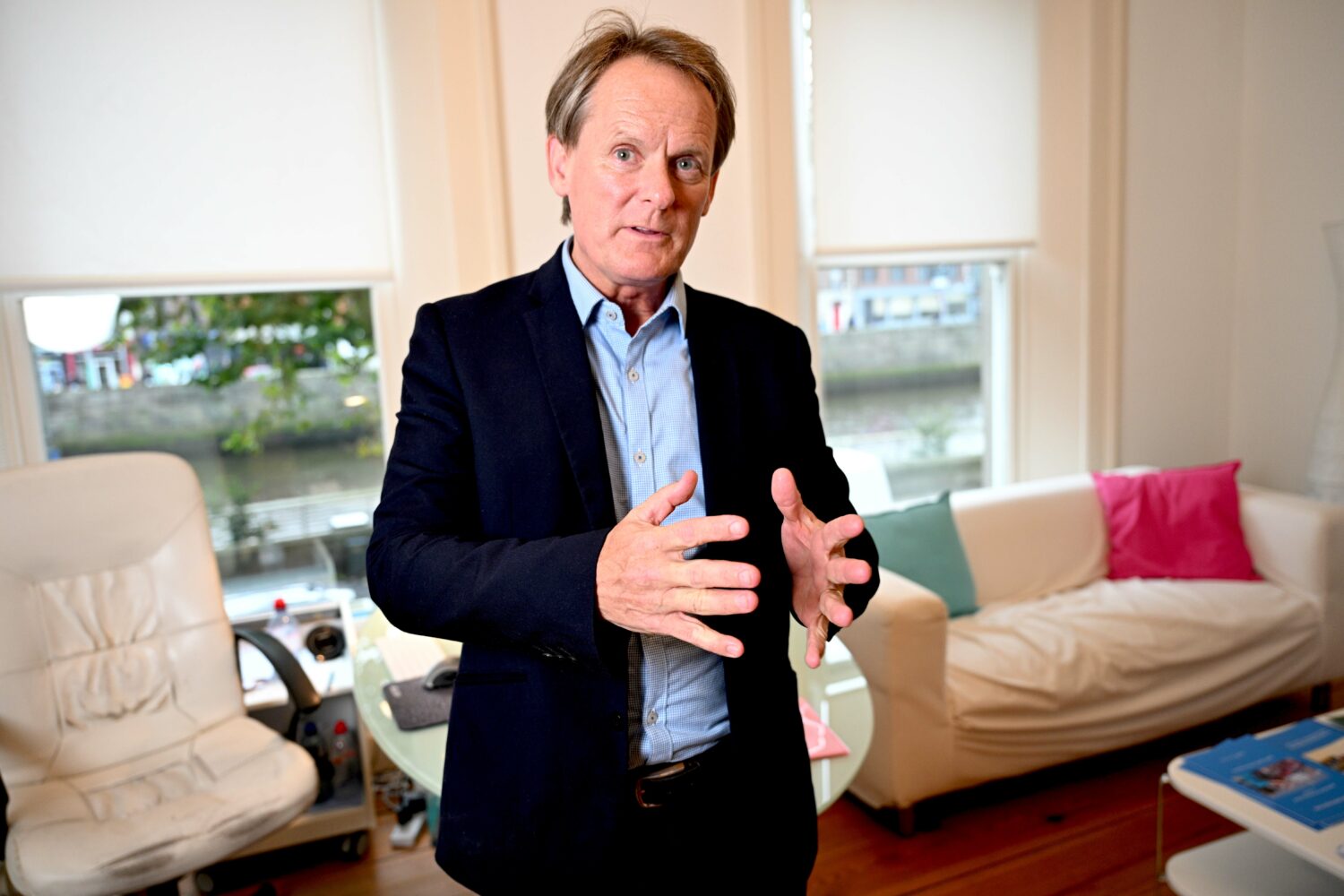It is just over a month since Peter Power, the executive director of UNICEF Ireland, was last in Gaza. He was there to visit the many projects that UNICEF funds, ranging from vital water desalination plants to education centres to the provision of social support for children living in the cramped conditions of a place that is half the size of Louth, where over half of its 2.3 million people are children.
In the first 18 days since Hamas attacked Israel, the Gaza Strip has witnessed more than 400 children killed or injured every day. Additionally, more than 30 Israeli children were killed and dozens remain kidnapped and held in captivity by Hamas within the Gaza Strip.
“Undoubtedly, some of the children we met have not survived the last few weeks. Many of the buildings we were in do not exist anymore,” Peter Power said. “Every time I see a building go down, I think, ‘were we in that building?’ I think of the children who have been killed and the many children we met and what lies ahead of them.”
UNICEF has a team of people still on the ground in Gaza, unable to get out because of Israeli blockades, who are also in danger as well doing vital work. “For security reasons, we are not saying a specific number but we have a substantial presence there,” Power said.
“One of our colleagues is in a small apartment with 17 other people. They’ve no water. They’ve no toilets. A big concern for UNICEF is water. In the first crossing with relief supplies, we got in 40,000 litres of water, but it is a drop in the ocean compared to what is needed.
“We’ve enough water on the Egyptian side for 270,000 people. We’re only able to get in enough water for 40,000 people, but we need much, much more and we need to get the desalination plants up and running. That’s critical.”
Children have no prospect of getting out
Power had visited one of the desalination plants on his recent journey to Gaza, so he knows firsthand how important it is. “I visited a UNICEF-sponsored desalination plant, which is really incredible to see. They take salt water from the Mediterranean, put it through high-pressure membranes and chemicals to extract the salt from it and out comes drinkable and palatable water,” he said.
“It’s one of three desalination plants in Gaza. UNICEF is taking the lead in terms of water, sanitation and hygiene. I am very sad to see that the plant is not in operation at the moment. Some of the materials that we have at the Rafah crossing at the moment are reagents to assist in the desalination process. We got some of them across the border but we need to get a lot more across to make that plant functional again.”
UNICEF also partners with the relief and human development agency UNRWA, the United Nations Relief and Works Agency for Palestine Refugees in the Near East. “We are working in schools with UNRWA and ensuring that children get education which they otherwise would not get,” Power said.
The Israel-Hamas war, he said, has made going to school almost impossible for children doing their best to stay alive. Power said most of the children he met in Gaza had never been outside the small pocket of land in which they lived. “The children whom I met, teenagers, have never been outside Gaza and have no prospect of getting out. It’s an incredible sort of state of existence.”
During his visit to Gaza, Power visited the various UNICEF projects which offer psychological and social support for children. “We did a UNICEF report on Gaza in 2014 that showed 80 per cent of the children there were suffering some signs and symptoms of psychological trauma,” Power disclosed.
“One of the centres we visited was being supported by UNICEF to provide support to those children who could be having nightmares or bed wettings and so on. Or they would display violent tendencies because of the experiences that they’ve had. What those children are going through now, I can only imagine. It is impossible not to think about them whenever we read about it or we see it on the screen.”
UNICEF delivers help to 400 locations every year
We meet Peter Power, a former minister of state in the Department of Foreign Affairs, in the Dublin office of UNICEF. He talks passionately about the difference UNICEF is making, and how Irish business can help it make an impact around the world. Power is 11 years in his role as chief executive and he said the support UNICEF received from Irish business after the invasion of Ukraine by Russia in 2022 was unprecedented.
“Ukraine was a huge turning point for UNICEF in terms of our engagement with the corporate sector here in Ireland,” he said. “We have traditionally had terrific support from companies like Aer Lingus and Primark to name just two of the big ones, but the Ukraine war was catalytic, in terms of how Irish business looked at UNICEF.”
UNICEF had a 25-year history of working in Ukraine and had a team of 220 people on the ground, so it was able to react rapidly. “We immediately ramped up our presence there. We sent a surge team from our global humanitarian HQ in Copenhagen and we were able to get a supply chain going to send relief supplies through Germany into Poland and then from Poland over to Lviv. We had a very clear chain, so we could deliver a huge amount of humanitarian supplies.”
“That’s our DNA, that is what we do,” Power said.
“The ‘E’ in UNICEF is for Emergency. We’ve been doing it for 70 years.” UNICEF, he said, delivers humanitarian assistance to 400 situations globally every year. Ukraine was the biggest one ever,” he said.
In 2022, the organisation procured and supplied $7.3 billion in goods and services to help children, almost double its capacity before the pandemic. Activating to help millions of children in Ukraine was an unprecedented supply chain challenge for it to run out of its giant logistics hub in Copenhagen and feeding right across a country that is about nine times bigger than Ireland.
“We are a partner than can impact across many countries.”
“People in business in Ireland got that because many of them have their own supply chains, so they could see how we ramped it up to support people who were leaving across the borders of many different countries,” Power said. UNICEF had already 220 people on the ground, so it was able to respond quickly inside Ukraine as well as its borders where large numbers of people were fleeing.
“Some of Ireland’s biggest companies and lots of smaller ones too got behind us as well as philanthropists, foundations and Irish people. Across all channels for our work around the world UNICEF Ireland received €33 million from the private sector throughout 2023,” Power said. “Irish business really got behind UNICEF’s work and very encouragingly they have stuck with us, and we have now forged deeper, more long-term partnerships with these companies.”
“UNICEF is not a charity. It is an inter-governmental agency that operates on a global scale,” Power said. “Many Irish companies are now global trading entities with footprints across dozens of countries,” Power said. Irish companies now wanted to partner with UNICEF for a number of reasons.
“They want to engage with a partner that has a ubiquitous presence in the markets in which they operate,” he said. UNICEF operates in more than 190 countries, so it is almost everywhere. The only major country it is not in is Russia. “No matter where Irish companies source their raw material from or where they sell their goods or supply their services, UNICEF has a presence there.”
This resonated with stakeholders in Irish companies across staff, suppliers, customers, communities, shareholders or other stakeholders. “This puts us in the ESG umbrella – particularly the S for Social,” Power said. “ESG is now a major driving force in the Irish corporate sector. Irish companies want to see the real tangible impact of the work they support. We are a partner that can have impact across multiple countries at scale.”
UNICEF, he said, was also aligned with the United Nations Sustainable Development Goals which many large companies have signed up to. “Governments cannot do this alone,” he pointed out. “Some of the biggest corporations in the world are bigger than many countries in the world. You cannot tackle global problems unless the biggest companies in the world and the corporate sector work collectively and in partnership with governments and UN agencies.”
A new understanding of corporate partnerships
UNICEF, he said, could demonstrate measurable impact as increasingly required by shareholders, especially in stock market-listed companies. In total, UNICEF works with 30,000 corporates worldwide, including hundreds that are either Irish or have significant operations in Ireland.
A final factor that UNICEF delivered was employee engagement. “No matter what partnership a company goes into, they want it to resonate with their staff,” he said. “There is a new understanding by the global and corporate community about the importance of ESG / CSR partnerships in the world.”
“There are very few companies now in Ireland that do not have an international footprint,” Power said. “So, what I would say to companies in Ireland is that if you want to have an ESG or CSR partnership, that resonates with your employees whether they’re in Romania, or Italy, or Columbia, or South America, or the US, or anywhere else then UNICEF is the perfect partner.”
Impartial actors across the globe
UNICEF is politically neutral, so it can play a role in complex situations as in the Middle East.
It is calling for both Israel and Hamas to cease attacking each other, without making a judgement as to who is in the right or wrong. “We’re calling for an end to bombing, we’re calling for a humanitarian pause,” Power said. “We’re also calling for Hamas to release the children kidnapped from Israel. We are an impartial humanitarian actor around the world.”
Being impartial, he said, allowed it to get supplies into Gaza when other less global charities were unable to. He said this allowed UNICEF to attract support from Irish companies who otherwise might be concerned about being seen to take a side in the conflict.

“I think the Gaza crisis presents sensitivities for everybody. I think so many people feel conflicted about this,” Power said. “We’re at the very early stages, obviously, of the crisis, but we have received strong support from both the public and the corporate sector. Certainly I think people are more sensitive to the fact that there are complexities and political sensitivities around this and some corporations would obviously be very aware of that,” Power said. “UNICEF is for every child, no matter where they are. A child is a child no matter where they’re born,” Power said. “We are advocates for the rights of children,” he added. “Children have clearly defined rights under international law. They are innocent civilians and have the right not to be bombed.”
“Civilian infrastructure, particularly hospitals and schools, have an absolute right not to be the subject of bombing,” he said. “In the same way that children should not be kidnapped and used as weapons of war as happened on October 7.”
“Preventing the violation of children’s rights is something that we will always advocate for at the very highest levels,” Power said. “We’re part of the UN system so we work with them, and we advocate separately, independently in every country. Here in Ireland, we advocate with the Irish government too for the rights of children who live here.”
It takes enormous logistics to have an impact at scale
The table in front of Power is covered with reports detailing UNICEF’s work around the world and the important role Ireland plays in it. Power picks up a report detailing how UNICEF ensured poor people got access to vaccines during the pandemic. “That’s the vaccine fund. We launched this report in Ireland. Irish companies gave €8 million towards the vaccine fund,” Power said.
“That fed into this huge pot from around the world that was able to procure 1.3 billion vaccines.” KPMG, he said, was one of the lead supporters of this fund globally. “They knew that they were contributing to an absolutely huge global effort to vaccinate as many children as possible around the world against Covid-19,” Power said.
“We were the delivery system as we knew how to procure, transport and deliver vaccines. It takes enormous logistics to have an impact at scale. UNICEF can be trusted to do that as it has been delivering major projects for decades.” Walking around UNICEF’s office, its staff can be heard taking payments from ordinary Irish people who want to contribute to Gaza. It is moving to hear one of UNICEF’s team helping a daughter make a donation of €80 to UNICEF as an 80th birthday present to her mother.
On the morning when we met, Power briefed his team on the unfolding crisis in Gaza. UNICEF had succeeded, he told them, in getting some water and hygiene kits or dignity kits across the Rafah Crossing Point, the only route between Gaza and Egypt.
“It is a really expensive operation,” Power said. “Water and kits have to be procured, loaded on trucks across the border, then unloaded and distributed through our networks in Gaza.” In the previous two weeks, UNICEF had raised one million euro in Ireland to assist in Gaza alone. “That money goes straight to that relief operation.”
“UNICEF was formed in the shadow of World War II, when millions of people suffered a major humanitarian crisis,” he said. “It’s coincidental that in the years 2021, 2022, 2023, UNICEF is back in Europe supporting people who are fleeing war and persecution in Ukraine. We’re back where we began. UNICEF is as important as ever.”

What keeps Power going as crisis follows crisis? “When I was in Gaza, I could see the scale at which UNICEF could respond,” he said. “It needs to do more, and will do more, in the times ahead. But knowing the impact we’re having and being part of such a global operation is incredibly inspiring to everyone in this office. When UNICEF gets going, it really can really change vast numbers of lives.”
UNICEF works in some of the world’s toughest places, to reach the world’s most disadvantaged children. Across more than 190 countries and territories, it works for every child, everywhere, to build a better world for everyone. UNICEF has recently launched a global fundraising appeal to support children in crisis in Gaza. Your business can help to rebuild childhoods that have been shattered by conflict. Please donate what you can at: https://www.unicef.ie/donate/business-response-for-children/#1.


